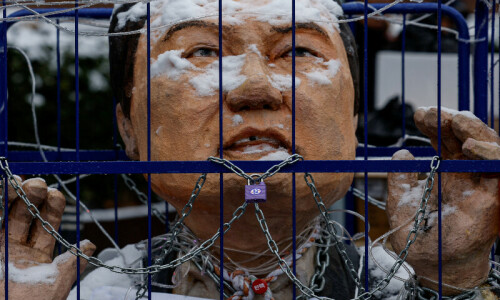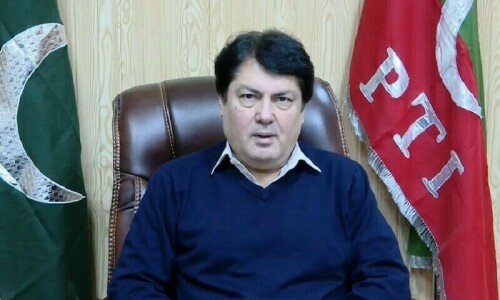
BEIJING: Tensions between the US and Pakistan over the killing of Osama bin Laden and a speedier US withdrawal from Afghanistan are likely to reinforce China and Pakistan's already strong ties, analysts say.
When Chinese leaders welcome Pakistani Prime Minister Yousaf Raza Gilani to Beijing this week, they will likely praise Sino-Pakistani “friendship” over the past 60 years - a stark contrast to recent Western criticism of Islamabad.
Analysts say Gilani's visit starting Tuesday will help Islamabad deflect mounting pressure from Washington and elsewhere, as Pakistan stands shoulder-to-shoulder with its long-time ally and neighbor.
“China is the only country that has taken a sympathetic stand for Pakistan after the bin Laden operation,” Talat Masood, a political analyst and retired Pakistani general, told AFP.
“This visit is important in the sense that it could counter (US) pressure on Pakistan. It shows Pakistan wants to say we also have some cards to play.” China has shown unswerving support for Pakistan since US special forces killed bin Laden at a compound near the country's top military academy on May 2, sparking speculation that Islamabad may have known about his whereabouts.
Foreign ministry spokeswoman Jiang Yu pointed out a few days after the al Qaeda chief's killing that Pakistan was nevertheless “at the forefront of the international counter-terrorism effort”.
Beijing's goodwill has not gone unnoticed.
“At this crucial juncture of history, I cannot say anybody is standing with Pakistan except for China,” Pakistan's popular opposition leader Nawaz Sharif told reporters.
Many in Pakistan, outraged by the unilateral US raid, are increasingly convinced that their nation's strategic alliance with the United States since 2001 has been less than positive and has only made the country less stable.
It could therefore be tempting for the nuclear-armed Islamic republic to move away from the United States and get closer to faithful ally Beijing, analysts say.
“If US and Indian pressure continues, Pakistan can say 'China is behind us. Don't think we are isolated, we have a potential superpower with us',” Masood said.
China is the main arms supplier to Pakistan, which sees Beijing as an important counter-balance to India - which has recently tightened its ties with the United States.
Beijing has also agreed to build several nuclear reactors in Pakistan.
Kerry Dumbaugh, an analyst at the Center for Naval Analyses, said Pakistan's pro-China stance on issues such as Taiwan, which Beijing considers part of its own territory, is also a key factor in Beijing's support for Islamabad.
“Pakistan serves as an advocate or a conduit for China in the Islamic world,” Dumbaugh said.
According to other experts, China is convinced that Pakistan will increase its influence in Afghanistan by 2015, taking advantage of the planned withdrawal of US troops.
China also needs Islamabad's cooperation in stemming potential terrorist threats in its mainly Muslim region of Xinjiang, which borders Pakistan.
Ultimately, China wants calm to reign, particularly in the Pakistani province of Baluchistan, through which it plans to transport oil from the Middle East in a pipeline linking Xinjiang to the Arabian Sea.
But experts warn that friendship between China and Pakistan has its limits.
“China is important for Pakistan and will remain so, but when it comes to hi-tech you have to go to the US and the West, also because of their clout in the World Bank and the International Monetary Fund,” political analyst Hasan Askari said.
Andrew Small, an expert on China-Pakistan relations at the German Marshall Fund of the United States, agreed.
The Chinese “get what they want out of the relationship already - having Pakistan to provide balance in the region to try to keep India tied down in South Asia rather than becoming a broader Asian or global power,” Small said.
“They're not going to want to be in a position where they end up with Pakistan on their plate to deal with.”












































